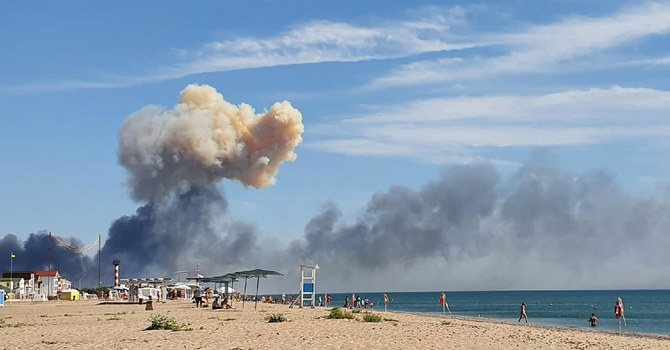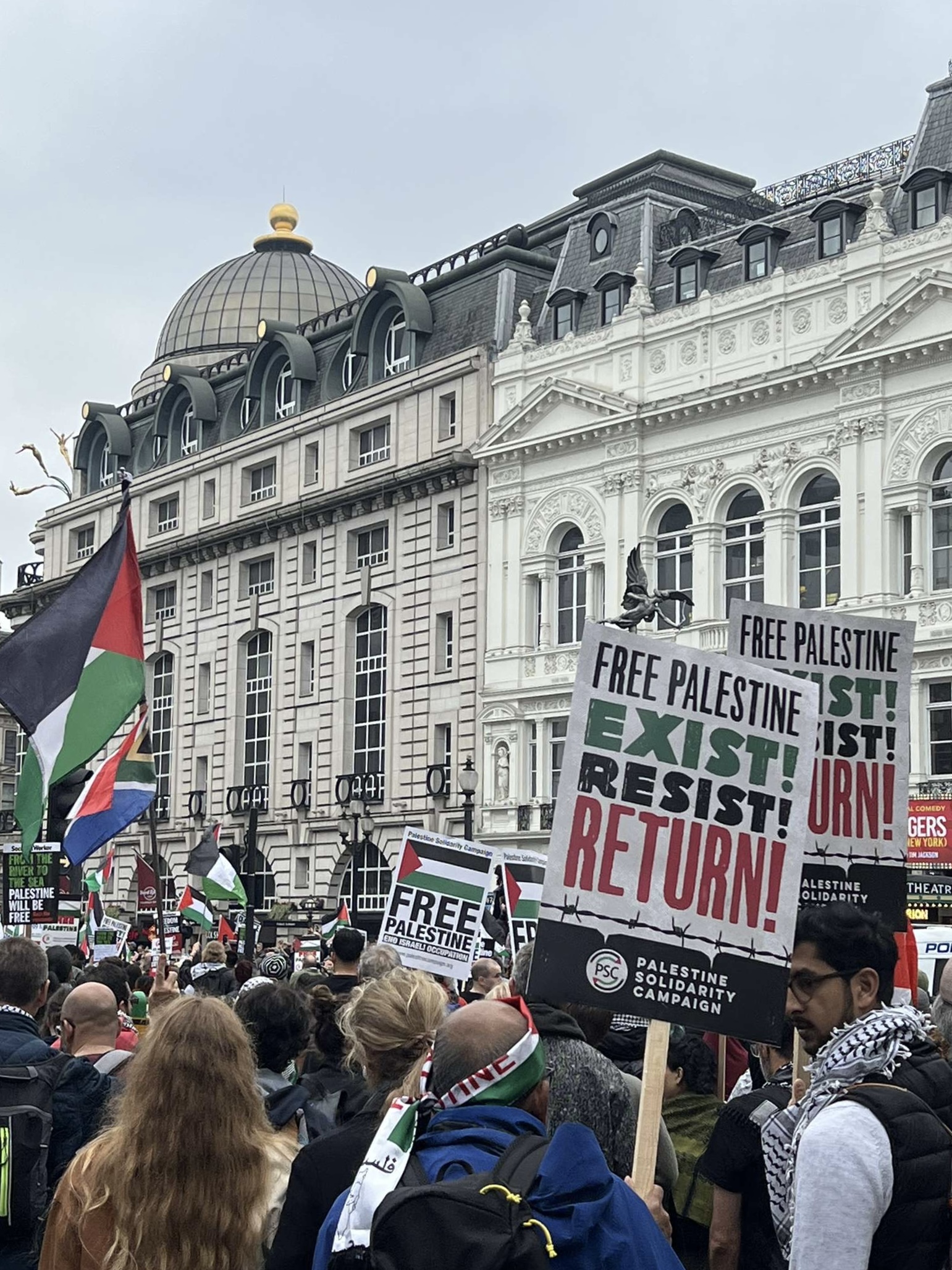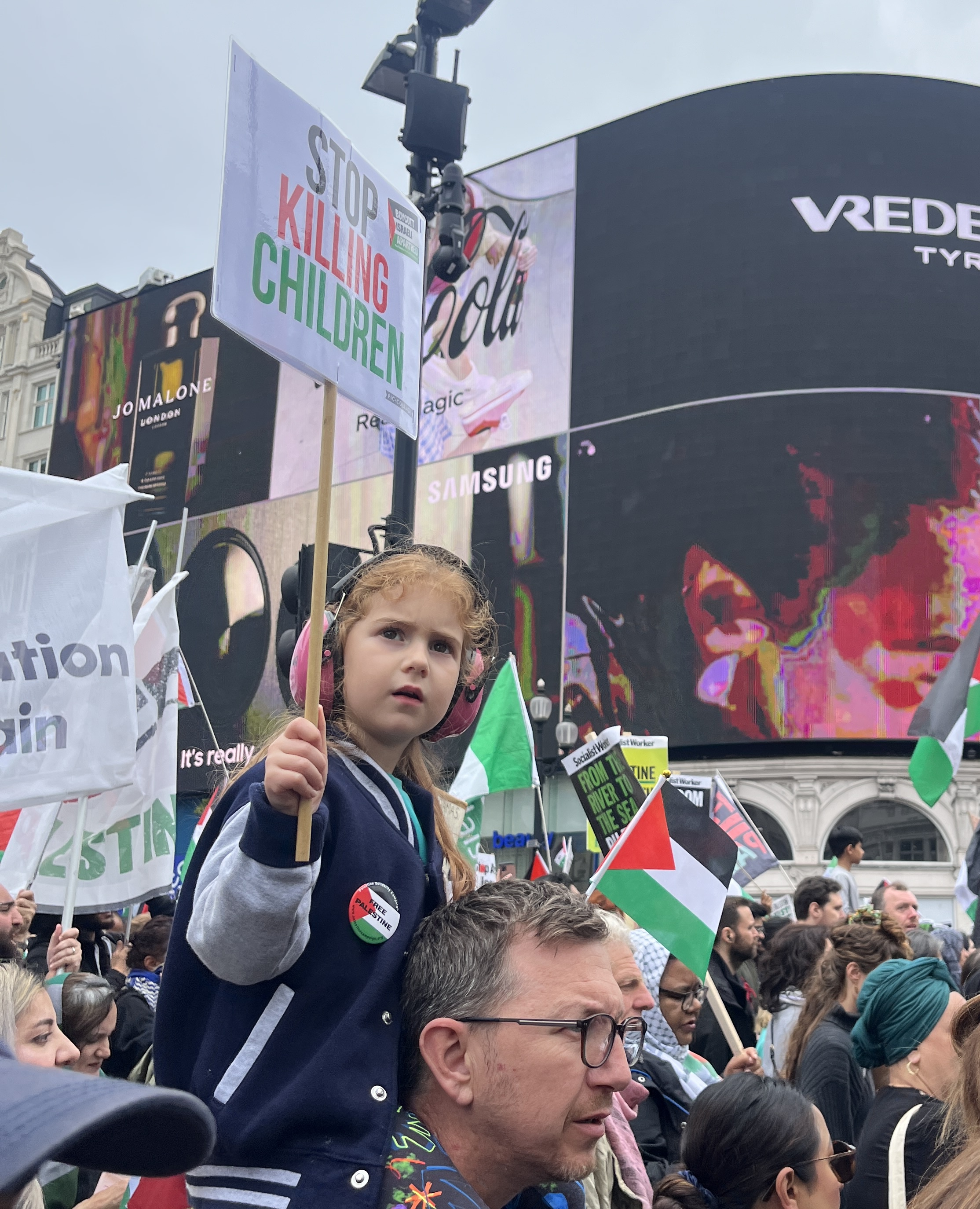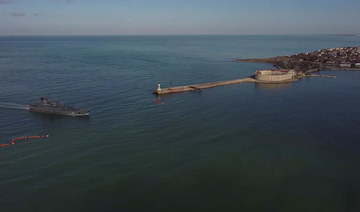KYIV, Ukraine: Massive explosions and fires hit a military depot in Russia-annexed Crimea on Tuesday, forcing the evacuation of more than 3,000 people, the second time in recent days that the Ukraine war’s focus has turned to the peninsula.
Russia blamed the blasts at an ammunition storage facility in Mayskoye on an “act of sabotage” without naming the perpetrators. As with last week’s explosions, they led to speculation that Ukraine may be behind the attack on the peninsula, which Russia has controlled since 2014.
Separately, the Russian business newspaper Kommersant quoted local residents as saying that plumes of black smoke also rose over an air base in Crimea’s Gvardeyskoye.
Ukraine has stopped short of publicly claiming responsibility for any of the fires or explosions, including last week’s at another air base that destroyed nine Russian planes. If Ukrainian forces were, in fact, responsible for any of the explosions, they would represent a significant escalation in the war.
Crimea holds huge strategic and symbolic significance for Russia and Ukraine. The Kremlin’s demand that Kyiv recognize the peninsula as part of Russia has been one of its key conditions for ending the fighting, while Ukraine has vowed to drive the Russians from the peninsula and all other occupied territories.
Videos posted on social media showed thick plumes of smoke rising over raging flames in Mayskoye, and a series of explosions could be heard in the background. The Russian Defense Ministry said the fires at the depot caused damage to a power plant, power lines, rail tracks and some apartment buildings. It said in a statement that there were no serious injuries.
Earlier, Russia’s state news agency RIA Novosti reported a fire a transformer substation after “a loud thump sound” in what appeared to be a result of the blasts at the depot.
The Dzhankoi district, where the blasts happened, is in the north of the peninsula, about 50 kilometers (30 miles) from the Russian-controlled region of Kherson in southern Ukraine. Kyiv has recently mounted a series of attacks on various sites in the region, targeting supply routes for the Russian military there and ammunition depots.
Last week’s explosions at Crimea’s Saki air base sent sunbathers on nearby beaches fleeing as huge flames and pillars of smoke rose over the horizon. Ukrainian officials emphasized Tuesday that Crimea — which is a popular destination for Russian tourists — would not be spared the ravages of war experienced throughout Ukraine.
Rather than a travel destination, “Crimea occupied by Russians is about warehouses explosions and high risk of death for invaders and thieves,” Ukraine presidential adviser Mykhailo Podolyak said on Twitter, though he did not claim any Ukraine responsibility for the blasts.
Crimea’s regional leader, Sergei Aksyonov, said that two people were injured and more than 3,000 evacuated from the villages of Mayskoye and Azovskoye near Dzhankoi following the munitions depot explosions.
Because the explosions damaged rail tracks, some trains in northern Crimea were diverted to other lines.
The Russian military blamed last week’s blasts at the Saki air base on an accidental detonation of munitions there, but it appeared to be the result of a Ukrainian attack.
Ukrainian officials at the time stopped short of publicly claiming responsibility for the explosions, while mocking Russia’s explanation that a careless smoker might have caused the ammunition to catch fire. Analysts also said that explanation doesn’t make sense and that the Ukrainians could have used anti-ship missiles to strike the base.
A British Defense Ministry intelligence update said vessels in Russia’s Black Sea Fleet “continue to pursue an extremely defensive posture” in the waters off Crimea, with the ships barely venturing out of sight of the coastline.
Russia already lost its flagship Moskva in the Black Sea and last month the Ukrainian military retook the strategic Snake Island outpost off Ukraine’s southwestern coast. It is vital for guaranteeing sea lanes out of Odesa, Ukraine’s biggest port.
The Russian fleet’s “limited effectiveness undermines Russia’s overall invasion strategy,” the British statement said. “This means Ukraine can divert resources to press Russian ground forces elsewhere.”
Meanwhile, in the Donbas, which has been the focus of the fighting in recent months, one civilian was killed in Russian shelling, and two others wounded, according to the Ukrainian governor of the Donetsk region, Pavlo Kyrylenko.
In Kharkiv, Ukraine’s second-largest city, one civilian was killed and nine others were wounded by Russian shelling, regional governor Oleh Syniehubov said. He added that the overnight attack on the city was “one of the most massive shelling of Kharkiv in recent days.”
Officials in the central region of Dniprotpetrovsk also reported shelling of the Nikopol and the Kryvyi Rih districts.
Amid the explosions and shelling, one good piece of news emerged from the region, with a United Nations-chartered ship loaded with 23,000 metric tons of Ukrainian grain setting off for the Horn of Africa.
It’s the first shipment of its kind, and the United Nations’ World Food Program called it “another important milestone” in a plan to assist countries facing famine. Ukraine and Russia reached a deal with Turkey in July to restart Black Sea grain deliveries, addressing the major export disruption that has occurred since Russia invaded Ukraine in February.
The worst drought in four decades in the Horn of Africa has led thousands of people across the region have died from hunger or illness this year.
That deal not only protects ships exporting Ukrainian grain through the Black Sea but also assures Russia that its food and fertilizer won’t face sanctions, safeguarding one of the pillars of its economy and helping ease concerns from insurers and banks.
Blasts, fire hits military depot in Russian-annexed Crimea
https://arab.news/vte9v
Blasts, fire hits military depot in Russian-annexed Crimea

- Russia blamed the blasts at an ammunition storage facility in Mayskoye on an “act of sabotage”
- Plumes of black smoke also rose over an air base in Crimea's Gvardeyskoye
1m march in London to mark 76 years of Nakba

- 2-km march led by Palestinian photojournalist Motaz Azaiza
LONDON: About 1 million people peacefully marched in London on Saturday to commemorate the 76th anniversary of the Nakba (Catastrophe), which saw the expulsion of nearly 800,000 Palestinians from their homeland when Israel was established in 1948.
Regular Saturday marches in London since the Gaza war began last October have drawn hundreds of thousands of participants.

Crowds gathered at the BBC headquarters for a 2-km march led by Palestinian photojournalist Motaz Azaiza and a group of young British Palestinians carrying large lock keys, which symbolize their inalienable right to return to their homes under international law.
Azaiza’s Instagram following has surged to over 18 million as he documented the daily realities of Israel’s invasion and relentless bombardment of Gaza.
Since January, the 24-year-old has been traveling worldwide to advocate for a ceasefire and an end to the Israeli occupation.
“I didn’t believe that I’d stay alive to stand today here in London in front of the people. You saw me there under the bombing,” he told the crowd.
“You made me hope that there was hope. I didn’t believe in anyone, but … today, the moment I saw you all I thought there’s hope. The hope is in the people, not in the governments.”
Several pro-Palestinian organizations across the UK organized the march, calling on the British government to halt arms exports to Israel and restore funding to the UN Relief and Works Agency for Palestine Refugees in the Near East.
“Today, we reflect on the reality that this Nakba couldn’t be sustained by Israel without the enduring complicity of Western powers, including successive UK governments,” said Ben Jamal, director of the Palestine Solidarity Campaign.
“Today, even in this darkest moment, we also march to celebrate and affirm the refusal of the Palestinian people to succumb to erasure. We won’t stop, we won’t rest, until the Palestinian people finally achieve their liberation.”

The rally was met with a much smaller counter-protest carrying Israeli flags. There were only eight arrests reported by the London Metropolitan Police.
Parts of northern India scorched by extreme heat with New Delhi on high alert

NEW DELHI: Parts of northwest India sweltered under scorching temperatures on Saturday, with the capital New Delhi under a severe weather alert as extreme temperatures strike parts of the country.
India’s weather department expects heat wave conditions to persist across the north for the next few days, and has put several states on high alert. On Friday, parts of New Delhi reported up to 47.1 degrees Celsius. The nearby states of Punjab, Haryana and Rajasthan also saw temperatures soar and are likely to stay high over the next few days, said Soma Sen Roy, a scientist at the India Meteorological Department.
Roy cautioned people against going outdoors under the afternoon sun, drink lots of water and wear loose-fitting clothes while those who are especially vulnerable like the elderly should stay indoors.
The extreme temperatures in northern India coincide with a six-week-long general election, with experts worried that the heat wave could increase health risks as people wait in long lines to cast their vote or candidates campaign aggressively in the outdoors. One minister fainted due to heat last month while addressing an election rally in Maharashtra state.
Satish Kumar, a 57-year-old rickshaw driver in the capital, said his work was suffering because of the heat. “People are not coming outside, (markets) are nearly empty,” he said.
Pravin Kamath, a 28-year-old who runs a cart selling cold drinks, complained that it was so hot he could hardly stand being outdoors. “But I must work. What can I do? I am poor so I have to do it.”
The main summer months — April, May and June — are always hot in most parts of India before monsoon rains bring cooler temperatures. But the heat has become more intense in the past decade and is usually accompanied by severe water shortages, with tens of millions of India’s 1.4 billion people lacking running water.
A study by World Weather Attribution, an academic group that examines the source of extreme heat, found that a searing heat wave in April that struck parts of Asia was made at least 45 times more likely in some parts of the continent by climate change.
Asian activists call out Western feminists over ‘selective empathy’ on Gaza

- Non-Western feminists say white supremacy, imperialism are inherent to Western feminism
- Seven months into Israel’s deadly war on Gaza, feminists in the West have been largely silent
JAKARTA: When Western actresses and female politicians cut their hair to protest the death of Mahsa Amini or rallied against the Taliban ban on girls’ education, they stood up to defend women’s rights. However, the zeal went missing when it came to Palestine, non-Western feminists say, denouncing their peers’ silence on Israel’s killing of women in Gaza.
Mass protests and displays of solidarity in Europe and the US broke out in 2022 and carried on into 2023 following the death in Iranian police custody of the 22-year-old Amini, who was charged with breaching hijab rules. In the same years, when the Taliban barred Afghan girls from school, women united in outcry and called for international pressure against them.
But more than seven months into Israel’s indiscriminate killing, wounding, and maiming of Palestinian civilians, the West’s mainstream feminist movement has been largely silent.
At least 35,800 people in Gaza have been killed and 80,000 wounded by Israeli airstrikes and ground offensive that have destroyed most of the enclave’s infrastructure and rendered it uninhabitable.
The majority of the dead are women and children. Many have lost their lives as most of the hospitals have been flattened by Israeli troops and no medical assistance could reach them.
The International Rescue Committee estimated last month that 37 mothers had been killed in Gaza each day and 60,000 pregnant women had no access to midwives or doctors, while tens of thousands struggled with breastfeeding as they were so malnourished due to Israel’s blockade of humanitarian aid.
In the face of the widely documented atrocities, Haein Shim, Korean activist and spokesperson of Haeil, a Seoul-based feminist group, told Arab News that Western feminists were exhibiting “selective empathy” and “double standards” with regard to Israel’s onslaught, the criticism of which has regularly been labeled as “antisemitism” — not only by Israeli authorities but by Western leaders as well.
“I strongly believe these issues are interconnected with racism, imperialism, and colonialism,” Shim said.
“We need to urge each other to break the silence and unite against occupation and subjugation, Israel’s human rights abuses and ongoing genocide. One thing to be clear: Our solidarity does not mean antisemitism but only to end the vicious genocide and violence against women and children.”
While Shim believes it is not too late for “global feminist solidarity” with women in Gaza, Fadiah Nadwa Fikri, Malaysian human rights lawyer and scholar focused on decolonization, sees an intrinsic flaw in Western feminism, which might prevent it.
“The function of Western feminism, which is inherently imperialist, is to reduce and dehumanize not only Palestinian women and children but also Palestinian men, who have been subjected to decades of Israeli settler colonialism, with the full support of US imperialism and its allies in Europe,” she said.
“It is, therefore, not surprising to witness the deafening silence of most Western feminists, who are staunch advocates of this strand of feminism, in the face of relentless imperialist violence in Gaza and all of historical Palestine. Their silence is an endorsement of the status quo.”
For Fikri, Western feminism has been shaped by “the racist narrative of the clash of civilizations,” and its silence on Gaza was merely consequential.
“We see women like Madeline Albright, Condoleezza Rice, Hilary Clinton, Kamala Harris — both white and non-white — who depict themselves as champions of women’s rights become members of the ruling classes of imperialist states that are responsible for the mass death, destruction, and suffering around the world,” she said.
“Therefore, there are no double standards of Western feminism; there is only one political standard meant to protect the interests of the imperialist ruling classes, which has been applied consistently.”
In the context of Israel and accusations of antisemitism fired against its critics, Asian feminists also cited the problem of white supremacy, which they closely linked with Zionism.
“Zionist ideologies are not just harming and discriminating against Palestinians, and the destruction of Palestine is not merely about Palestine. Zionism is about white supremacy and colonization, and the destruction of Palestine is just another example of imperialist violence inflicted by Western colonizers, aka white people,” said V., member of Chinese Feminism in Toronto, a Canada-based grassroots collective, who requested to remain anonymous.
“If we consider the sociopolitical context of North America, we know most Jews are also white people, yet we do not have the space to discuss the complexity of antisemitism and white supremacy simultaneously. I guess that speaks a lot (as to) why white feminists tend to be hypocritical here.”
Her colleague, G., also a member of the group, said that hypocrisy was also present among non-white women leaders who were “internalizing whiteness” and embracing Zionism.
“We need to understand this should not be done in our names. We need to have firm voices and expose these leaders as Zionist agents and complicit in genocide, instead of accepting the fact that our elected leaders turn complicit and no longer represent us. We need to hold them accountable,” she said.
“Decolonization is not just theory. We all need to move beyond the bystander observer position and let Palestine radicalize us. We need to continue to educate ourselves and our communities on colonial feminism/pinkwashing and purplewashing.”
Part of the struggle is debunking pro-Israel propaganda and fighting “against the utilization of antisemitism to shut down any criticism against Israeli or Zionist policies,” according to Okky Madasari, Indonesian novelist and academic, whose research focuses on knowledge production and censorship.
“There must be a unified campaign to stop believing anything coming out from the Israeli authorities. They are liars unless they are proven otherwise,” she told Arab News.
For those activists who for the past seven months have been silent over Gaza, Okky suggested that they stop using the feminism label altogether.
“You should be ashamed of yourself if you don’t speak up against Israel when you are so fussy about many other more trivial things,” she said.
“Condemning Israel and taking sides with the Palestinians is what any decent human being must do, let alone if you are a feminist.”
Parts of northern India scorched by extreme heat with New Delhi on high alert

- India’s weather department expects heat wave conditions to persist across north for next few days
- On Friday, parts of New Delhi reported up to 47.1°C, with temperatures also soaring in nearby states
NEW DELHI: Parts of northwest India sweltered under scorching temperatures on Saturday, with the capital New Delhi under a severe weather alert as extreme temperatures strike parts of the country.
India’s weather department expects heat wave conditions to persist across the north for the next few days, and has put several states on high alert.
On Friday, parts of New Delhi reported up to 47.1 degrees Celsius (116 degrees Fahrenheit). The nearby states of Punjab, Haryana and Rajasthan also saw temperatures soar and are likely to stay high over the next few days, said Soma Sen Roy, a scientist at the India Meteorological Department.
Roy cautioned people against going outdoors under the afternoon sun, drink lots of water and wear loose-fitting clothes while those who are especially vulnerable like the elderly should stay indoors.
The extreme temperatures in northern India coincide with a 6-week-long general election, with experts worried that the heat wave could increase health risks as people wait in long lines to cast their vote or candidates campaign aggressively in the outdoors. One minister fainted due to heat last month while addressing an election rally in Maharashtra state.
Prime Minister Narendra Modi as well as his main challenger, Rahul Gandhi of the opposition Congress Party, are expected to hold rallies in New Delhi later on Saturday, as the city heads to the polls on May 25.
Satish Kumar, a 57-year-old rickshaw driver in the capital, said his work was suffering because of the heat. “People are not coming outside, (markets) are nearly empty,” he said.
Pravin Kamath, a 28-year-old who runs a cart selling cold drinks, complained that it was so hot he could hardly stand being outdoors. “But I must work. What can I do? I am poor so I have to do it.”
The main summer months — April, May and June — are always hot in most parts of India before monsoon rains bring cooler temperatures. But the heat has become more intense in the past decade and is usually accompanied by severe water shortages, with tens of millions of India’s 1.4 billion people lacking running water.
A study by World Weather Attribution, an academic group that examines the source of extreme heat, found that a searing heat wave in April that struck parts of Asia was made at least 45 times more likely in some parts of the continent by climate change.
Climate experts say extreme heat in South Asia during the pre-monsoon season is becoming more frequent and the study found that extreme temperatures are now about 0.85 C (1.5 F) hotter in the region because of climate change.
At least 28 heat-related deaths were reported in Bangladesh, as well as five in India in April. Surges in heat deaths have also been reported in Thailand and the Philippines this year, according to the study.
Extreme heat is fast becoming a public health crisis in India, with more than 150 people dying last year during heat waves. The government estimates nearly 11,000 people have died during heat waves this century, yet experts say such figures are likely a vast undercount.
Slovak PM Fico stable but in serious condition

- Robert Fico underwent a two-hour operation on Friday that increased hopes for his recovery
- Slovak police have charged a man identified by prosecutors as Juraj C. with attempted murder
BANSKA BYSTRICA, Slovakia: The condition of Slovak Prime Minister Robert Fico has stabilized but remains serious, the country’s health minister said on Saturday, following Wednesday’s assassination attempt against the central European leader.
Slovakia’s deputy prime minister also said the transfer of Fico to the capital Bratislava from the small-town hospital near the area where he was shot five times at point blank range would not take place in the coming days.
There was no need to formally take over Fico’s official duties and some communication with the premier was taking place, Deputy Prime Minister Robert Kalinak told reporters in front of the hospital where Fico was being treated.
Fico underwent a two-hour operation on Friday that increased hopes for his recovery. The attack sent shockwaves throughout Europe and raised concerns over the polarized and febrile political situation in the nation of 5.4 million people.
Slovak police have charged a man identified by prosecutors as Juraj C. with attempted murder. Local news media say he is a 71-year-old former security guard at a shopping mall and the author of three collections of poetry.


















